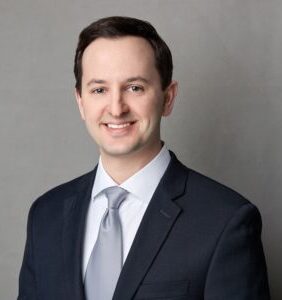Department of Speech, Language, and Hearing Sciences achieves 30 years of training scientists under T32 grant
Written By: Rebecca Hoffa, rhoffa@purdue.edu

Professor Beth Strickland (left) and Professor and Department Head Preeti Sivasankar (right) celebrate 30 years of T32 grant funding in the Department of Speech, Language, and Hearing Sciences.Photo provided
Purdue University’s Department of Speech, Language, and Hearing Sciences (SLHS) is celebrating 30 years of funding with the National Institutes of Health’s T32 training grant, which was recently renewed for another five years in the department. This grant supports funding for three students who are working toward their PhD and one postdoctoral researcher in SLHS each year with the goal of advancing leaders in the field and bridging the gap between clinical training and research.
The department’s T32 grant is directed by Beth Strickland, professor of speech, language, and hearing sciences, with Preeti Sivasankar, professor and SLHS department head, serving as associate director, although countless faculty contribute to the implementation and success of the grant each semester.
“Everybody’s success is your success because you’re looking at the department as a whole, so it really depends on the activities of everybody in the department,” Strickland said.
When the program began in 1991 under the direction of Ronnie Wilbur, professor of speech, language, and hearing sciences, the department aimed to offer more opportunities for postdoctoral fellows while also filling the shortage of individuals with PhDs in fields of communication sciences.
The training grant typically focuses on two main groups of individuals: those with a strong clinical background, who will receive training in the science and research behind the clinical practice, as well as those with a strong research background, who will receive training to apply the science to communication disorders.
“In our field of communicative sciences and disorders, we really need people to keep driving the science forward,” Strickland says. “This grant is such an important funding and training mechanism for our department.”
The grant has had a significant influence on the graduates of the program, allowing them to reach esteemed faculty positions at institutions across the country. The Department of Speech, Language, and Hearing Sciences keeps track of previous T32 trainees for 15 years after they have graduated from the program or, in the case of postdoctoral fellows, left the University.

Gavin BidelmanPhoto provided
Former T32 trainee Gavin Bidelman, who received his PhD from Purdue in 2011, is finishing his time as a professor at the University of Memphis and will soon be joining the faculty at Indiana University as a professor of speech, language, and hearing sciences. As a professor, Bidelman studies the neural encoding of sound in the brain and how it changes as a result of experiential factors — a line of research that began during his doctoral studies on the T32 grant at Purdue.
Bidelman arrived at Purdue with a science-heavy background in sound engineering after receiving his Bachelor of Science from the University of Michigan, and the T32 grant allowed him to continue on a research trajectory, focusing on applying the science to communication disorders. Since graduating with his PhD from Purdue SLHS, Bidelman has accumulated a long list of publications and awards, and he noted the experience on the training grant really served as a career accelerant.
“Because I was on the training grant, I was really able to craft my own research program and my research interests under the guidance of my mentors,” Bidelman said. “It allowed me to ask questions and pursue some research questions somewhat independently. I was not necessarily tethered to a research problem of my mentor. That allowed me to explore my own thoughts and questions.”

Elizabeth Erickson-DiRenzoPhoto provided
Like Bidelman, Elizabeth Erickson-DiRenzo, assistant professor at Stanford University, credits the T32 grant with helping her excel in her career. Erickson-DiRenzo currently studies techniques to improve the prevention and management of voice disorders in Stanford’s School of Medicine. Erickson-DiRenzo noted that it wasn’t just the dedicated research time that benefited her but also the training that prepared her for becoming a faculty member.
“That training is the key component, and the training is extensive,” Erickson-DiRenzo said. “It’s about how to create a programmatic line of research, how to design a study, how to do it with the correct controls and ethically.”
After Erickson-DiRenzo graduated from Purdue with her PhD in 2012, she completed a postdoctoral fellowship at the University of Wisconsin, where she was also funded by a T32 grant. Now, Erickson-DiRenzo is seeing her experience with the T32 grant come full circle as she gets ready to begin her first mentorship role under Stanford’s training grant this summer.
“Going into this mentorship opportunity, I have a better understanding of what good training entails,” Erickson-DiRenzo said. “I did not fully appreciate a decade ago when I was on this grant how the training I was receiving was critical to success in all aspects of academic life. It is clear what the faculty put into their trainees in terms of giving them a truly well-rounded experience.”
The Department of Speech, Language, and Hearing Sciences is one of only nine schools to have received this grant for 30 years or more, included among Harvard Medical School, the University of Michigan and the University of Washington.
“Purdue is very fortunate to have a training grant,” Bidelman said. “Not all institutions do or can support it. They’ve done it right for the better part of three decades, and it’s created some fabulous scientists in the speech and hearing field. I can’t say enough good things about it.”
Discover more from News | College of Health and Human Sciences
Subscribe to get the latest posts sent to your email.